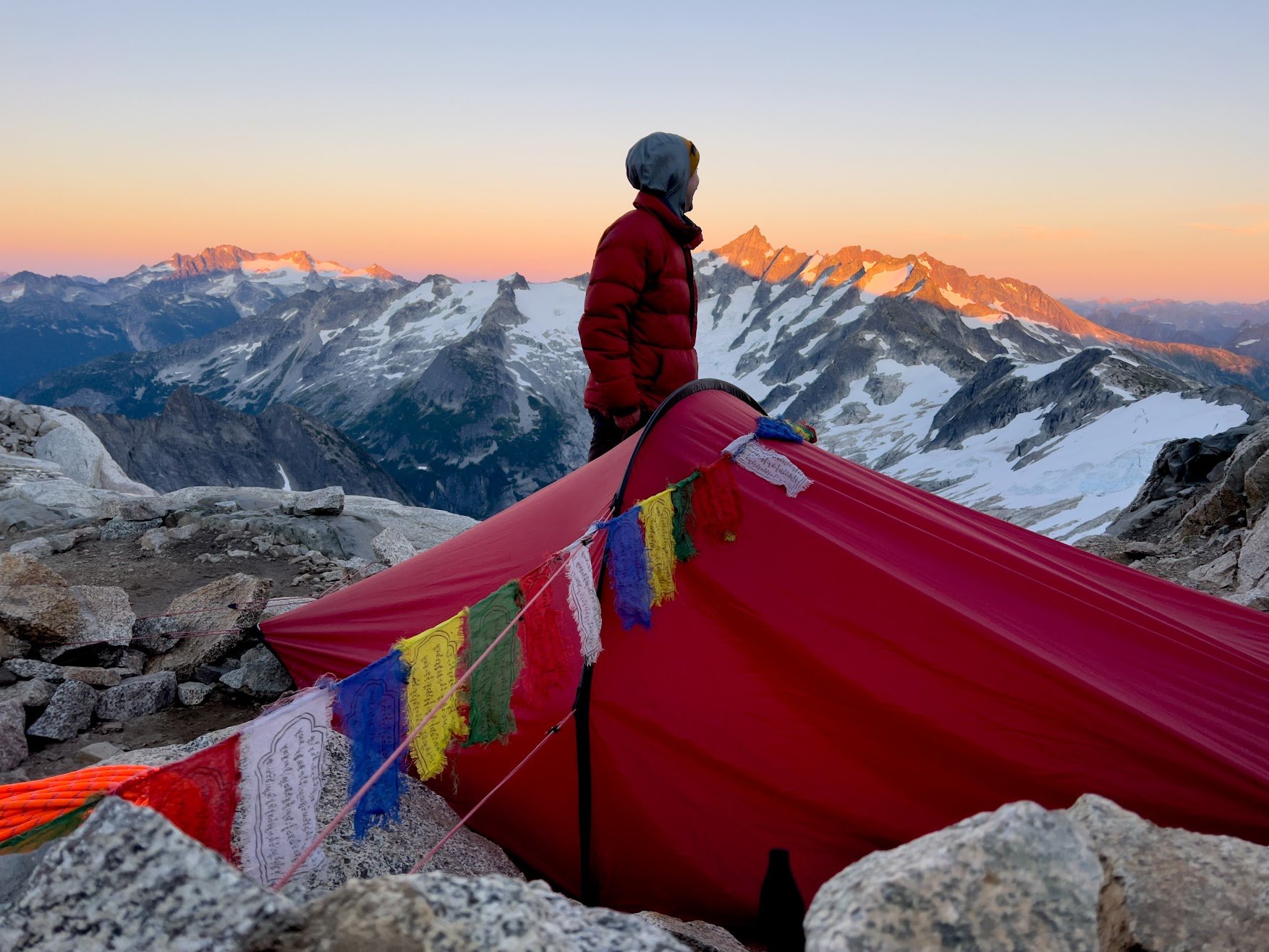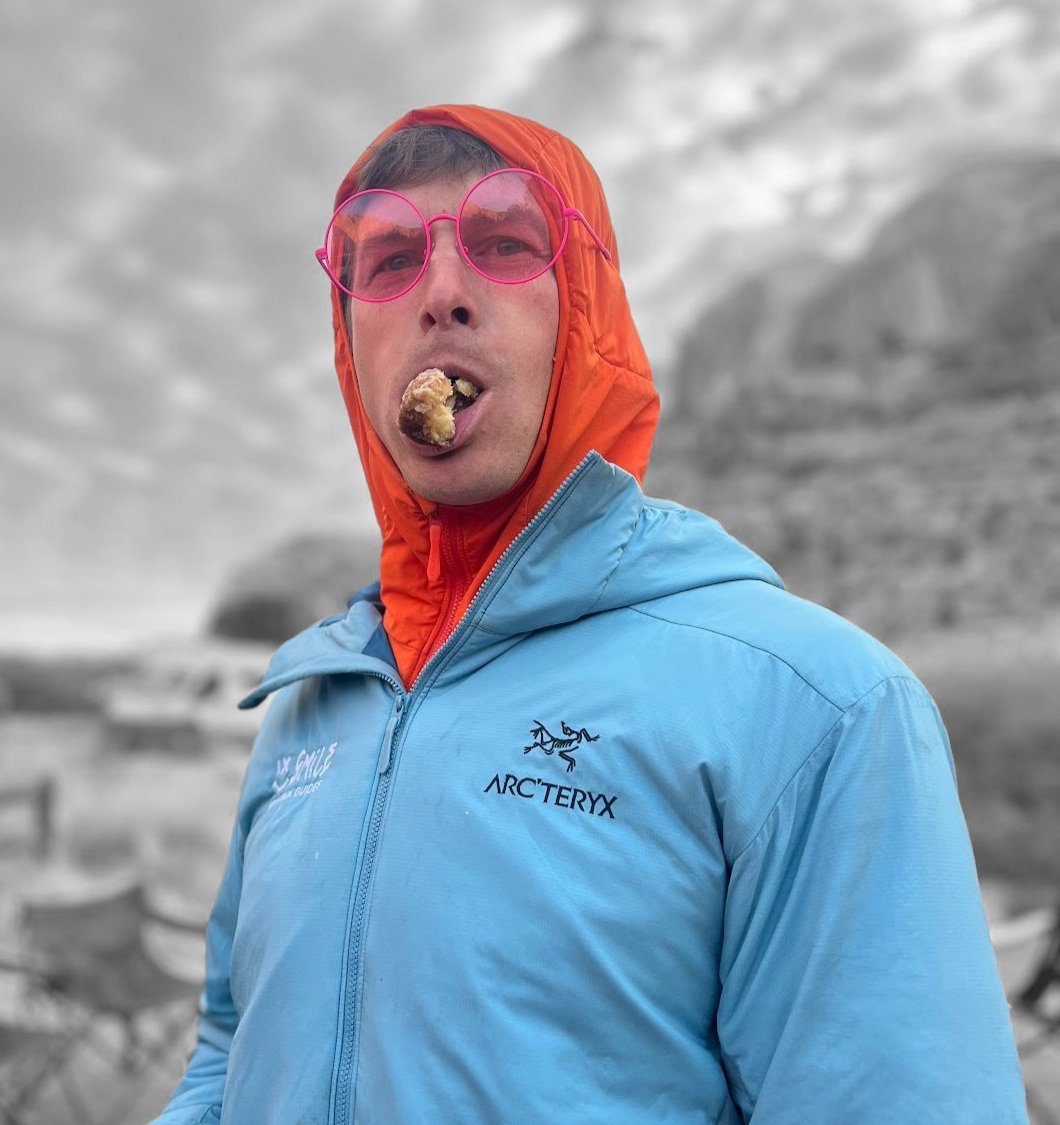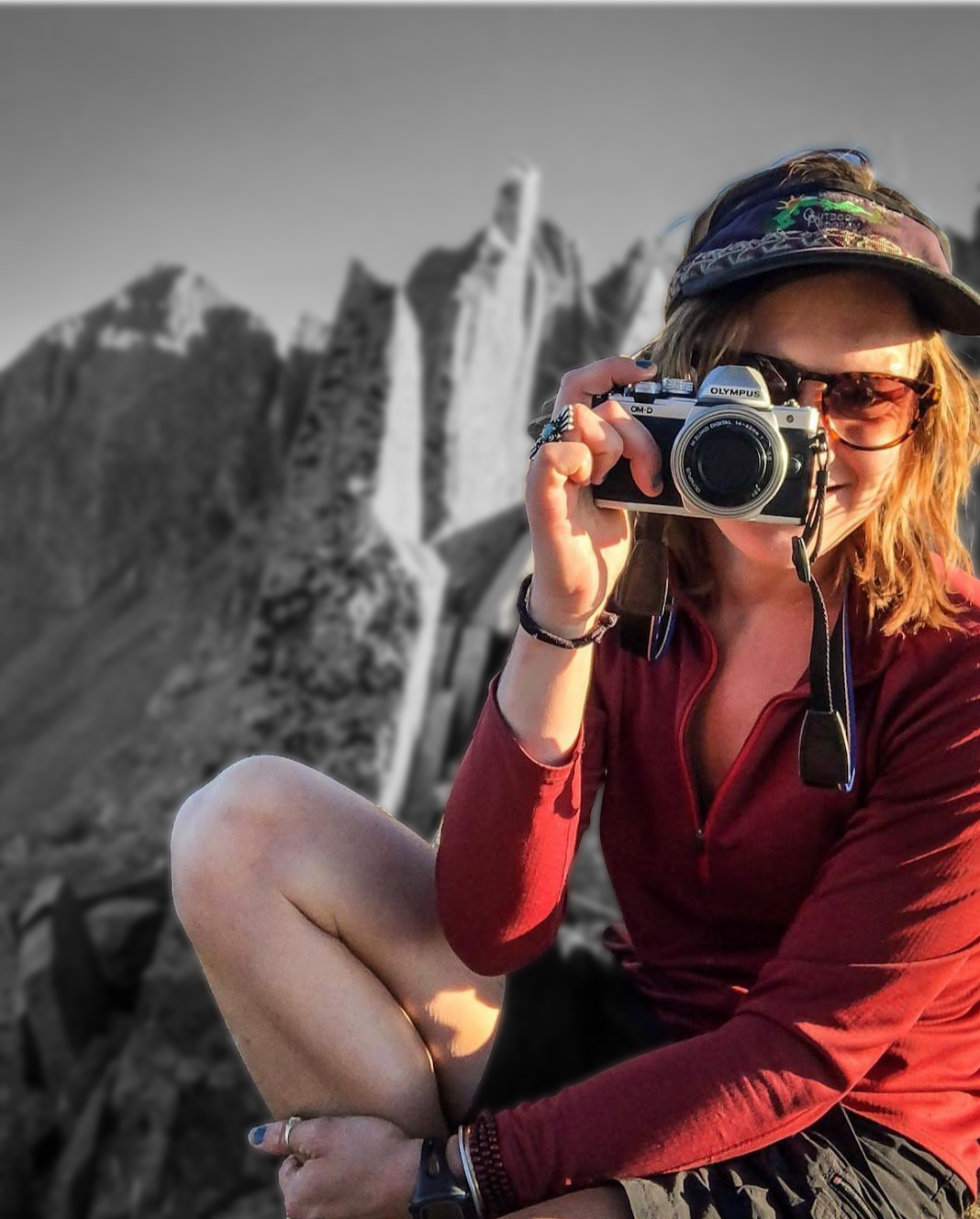
Eldorado Classics
Eldorado
Classics
Single:$1775
2 CLIMBERS: $1050 /PERSON
Advanced
Eldorado Peak, Washington
3-Days
Located in the rugged North Cascades National Park, Eldorado Peak is famous for its knife edge summit ridge and its unsurpassed views. The team will have ample opportunity to practice glacier mountaineering skills before reaching the exposed East Ridge, which involves steep snow with wonderful climbing exposure.
This is without a doubt one of the most famous views in Washington — don’t forget your camera!

-
Located in the rugged North Cascades National Park, Eldorado Peak is famous for its knife edge summit ridge and its unsurpassed views. The team will have ample opportunity to practice glacier mountaineering skills before reaching the exposed East Ridge, which involves steep snow with wonderful climbing exposure.
This is without a doubt one of the most famous views in Washington — don’t forget your camera!
We lead this route at a 2: 1 climber-to-guide ratio ensuring that you receive a high degree of hands-on instruction before the climb and have a small, efficient rope team during the summit ascent.
Our cramponing, ice axe, and rope travel skills training for this climb takes place right outside our tent door.
This three-day instructional course/summit is a perfect introduction to alpine mixed climbing and intermediate mountaineering skills that we develop in our Alpine Climbing Foundations program.
*With a 2:1 climber-to-guide ratio, we offer personal experiences and hands-on training with an experienced guide team.
-
Pre Couse Trip Call:
Guides and guests connect via Google Meet to discuss gear selection for the course, meet our new teammates, discuss the climb, and, answer any lingering questions the team has.
The Evening Before:
Guides extend the offer to meet at a local park to cover any last-minute gear needs and cover packing for the trip. Usually, we then go out for some dinner in town.
Day One:
Your guides will meet you at the ranger station for introductions, registration for the climb, group gear distribution, and personal gear check.
We then drive through a beautiful forest on a logging road entering deep into the park. At the trailhead, we get ready for a hard hike to camp. This will be the most physically demanding day of the trip as we ascend 5000’ with 45-50 lb packs.
After setting up a solid mountain camp, we relax for the evening.
Day Two:
Morning wake-up and breakfast lead the way to a new alpine adventure.
Our day begins with an alpine start to give us ample time for this full day of climbing. As we enter the glacier we are rewarded with a fun, moderate climb on which we employ our cramponing, route finding, and navigational skills, making our way around crevasses to the summit pyramid.
On our ascent, we climb steadily for one to two hours at a stretch and then break for 10 to 15 minutes.
*A typical roundtrip summit push is 8-10 hours from camp.
Day Three:
The team wakes up from high camp and enjoys an early morning breakfast before packing up and heading back down to the trailhead ( three to four hours).
The trip concludes with a celebratory lunch in Sedro-Woolley. Those with a plane to catch should plan for an arrival in Seattle around mid-afternoon.
The itinerary is subject to change due to conditions.
-
NORTH CASCADES: GETTING THERE
North Cascades National Park, Washington State is located 2 hours Northeast of Seattle. The Pacific Northwest is beautiful and thriving both in its cities and its parks. Make sure you plan to spend some time in town before and after your SMG trip. Bellingham and even closer Sedro-Woolley serve as the launching points for all of our climbs in North Cascades National Park.
The best option for flying to the area is through Seattle, WA. Many airline options exist, and because Sea-Tac is a major airport and Seattle a major travel destination there are typically many flights to choose from.
You will need to organize a rental car to drive to Bellingham or Sedro from Seattle. Typically in the summer months, you can choose any type of vehicle.
There are many great hotels, suites, and vacation rentals for you to stay in while you’re in the area. Give our office a call at 410-982-8282 if you have any questions about what would suit you best for this trip! Below are just a few options catering to different lodging styles and preferences in Bellingham:
VRBO
Sedro Woolley also has a number of great hotels, suites, and vacation rentals for you to stay in while you’re in the area. Give our office a call at 410-982-8282 if you have any questions about what would suit you best for this trip!
Three Rivers Inn Hotel

-
FOOTWEAR
+Sticky Rubber Approach Shoes Optional for the
hike to highcamp
+Socks
UPPER LAYERS
+Synthetic T-shirt
BOTTOM LAYERS
GLOVES/HATS
+Buff
BACKPACKS
+45-55L Hike-in and Climbing Pack (one-pack option)
ACCESSORIES
+Sunglasses, Sunscreen, Lip Balm, Sun Hat
+Nalgene, Minimum 1.5L
+Climbing Snacks: 100 calories an hour!
CAMPING KIT
OR
EQUIPMENT
+Belay Device w/Locking Carabiner
+3 Additional Locking Carabiners
+120cm Sewn Sling w/ Non-Locker
+Autoblock Cord w/ Non-Locker
Smile Mountain Guides can supply rock climbing gear including helmets, harnesses, ropes, cams, slings, carabiners, belay/rappel devices, ice axes, and crampons. *We do not provide alpine boots
Check out our Alpine Climbing Fundamentals Seminar for our entry-level-glacier alpine climbing program.
-
BREAKFAST (~300 – 600 CALORIES) X 2
Having a hot breakfast is important, especially in cold weather environments. Most climbers go with instant or quick-cooking hot cereals like oatmeal or Cream of Wheat, or dry cereals and powdered milk mixed with hot water. All of these meals taste better and provide more calories when fortified with dried fruits, nuts, honey, butter, and even chocolate chips! Tastier (and heavier!) breakfast ideas are included below.
For your course, you should have 4 breakfasts. About half of these should be basic meals to decrease weight on the mountain and the remaining can be more luxurious. Don’t forget your hot drinks!
Breakfast Ideas
– 1 cup of granola + freeze-dried fruit + 3 tablespoons of powdered milk mixed with hot water
– 2 packs of instant oatmeal + dried fruit + nut butter
– Dehydrated breakfast meal (check serving and calories)
– 2 packs of instant grits + bacon crumbles + cheese + butter + salt and pepper to taste
– 2-4 powdered eggs + 4-6 strips precooked bacon + tortilla
LUNCH (~800 – 1600 CALORIES) X 3
Lunch begins just after breakfast and ends just before dinner. It is the most important meal of the day and needs to have enough variety to keep you happy over your trip. Continuous eating of small quantities will keep up your energy levels for the whole day, especially on big travel/summit days where we will be on the move for 8 hours or more.
For your course, you need lunch food for 5 days. Determining the amount of lunch food to bring is difficult to gauge on your first mountaineering expedition. General guidelines are given below. The rule many guides work with is the weight of your lunch food should be equivalent to the weight of your breakfast and dinner food added together.
Each day it’s nice to have a “real” food item. You may consider some of these tasty sandwich/wrap combinations:
1. Start with a hearty bread product: flatbread, bagel, naan, flour tortilla, croissant, or pita pocket
2. Add protein: hard cheese, Laughing Cow cheese wedges (no refrigeration needed), cured meat, black beans or hummus, nut butter (we like Trail Butter because it comes in a squeeze pouch), tuna pouch, or smoked salmon
3. Add flavor/texture: dried fruit, chips, hot sauce, mustard, or pesto. Also consider, a hearty pre-made sandwich, leftover pizza, or a burrito for the first day of the course
In addition, pack snack foods to supplement any sandwiches or wraps, such as:
– Nuts (cashew and almonds personal favorite – can buy in 1lb quantities at Trader Joe’s)
– Jerky – beef, turkey, bacon, salmon, and tofu jerky are all great options
– Dried fruit (Trader Joe’s has an excellent selection prepackaged by weight)
– Peanut butter filled pretzel chunks
– Trail mix
– Cheese sticks/squares
– Plantain chips
For summit day or big travel days (approximately 2 on a 3-day course) focus on energy-rich food. On these days we travel for roughly an hour between breaks. At each break, you should be eating 200-300 calories (or about 1 energy bar). These days can have 4-8 breaks. These foods include:
– Energy bars – focus on bars with real ingredients. We love Probars, Pure Organic, Kit’s Organic, Larabar, and Chia Bars. If you are ambitious, try making your own!
– Energy chews (Shot Bloks or the like)
– GU’s, Cliff Shots, etc.
– Candy bars (Snicker’s are a favorite of most climbers)
– Gummy bears
DINNER (~800 – 1200 CALORIES) X 2
For the greatest preparation and cooking ease, freeze-dried food is an option. Usually, these foods only require adding boiling water and are ready within minutes. Downsides to freeze-dried food are the cost, an increase in single-use packaging which must be packed out, uninteresting flavors or textures, gut issues from poorly re-hydrated meals, constipation, etc.
With slightly more effort but vastly reduced cost, any supermarket can be tapped for a wide variety of wilderness-ready prepared foods. Items like Knorr rice or pasta entrees in envelopes cook in 5 to 10 minutes, and are very tasty. It is best if you experiment ahead of time at home so that you know which you prefer. For those with a culinary creative streak, very tasty meals can be made up from scratch with only a minimum of additional effort. Items such as quick brown rice, quick or instant white rice, bulgur, instant precooked or dried beans, dehydrated vegetables, packaged or bulk sauce mixes, smoked salmon, exotic cheeses, and whatever spices and herbs you like or want to experiment with can be combined for tasty meals.
You will need 4 dinners for your course. Many guides bring soup packets, like instant miso soup, for each meal (unless the meal is already soup-based). These make great pre-dinner hot drinks and help us hydrated. Don’t forget your hot drinks!
Dinner Ideas
– 1 packet instant ramen noodle soup + sweet and spicy jerky (shredded) + parmesan cheese + dehydrated vegetables
– 1 pre-pouched Indian Meal (we like Tasty Bites) + boil in the bag rice + coconut oil (vegetarian/vegan depending on meal choice)
– 1 box mac and cheese + sundried tomatoes + tuna packet + red pepper flakes
– 1 box cous cous + sundried tomatoes + pine nuts + chunks of salami
PREPARATIONS TO ELDORADO ZONE CLASSICS
Technical Experience
No previous technical experience is required to climb in the Eldo Zone. If you would like a glacier experience in an educational environment before climbing the Sulphide, please consider our Intro to Mountaineering Seminar.
Fitness
Excellent physical fitness is required. Climbers must be able to hike for many hours while carrying a pack. Training for Advanced Alpine Climbing is a great fitness program to develop a strong alpine climbing base. 50% intensity of this program is a good marker of fitness to climb the Sulphide Glacier Route.
Meet The Team
FAQ’s
Eldorado Classics
The answers to our most commonly asked questions about climbing in the Eldorado zone.
-
PRICE INCLUDES
+Guide fees (2:1 climber-to-guide ratio)
+Park fees
+Group equipment such as ropes, snow and ice protection etc.
+Liquid fuel for white gas stoves (canister fuel is available for purchase)
+Group cook craft items
+SMG Buff
PRICE DOES NOT INCLUDE
+Personal equipment (see Gear List)
+Transportation
+Meals – Part of our ethic is to teach self-sufficiency in the mountains, which includes backcountry cooking. See our suggested Food Plan Below.
+Hotels/lodging in Seattle, Bellingham, or Sedro-Woolley
+All expenses incurred in the event of early departure (evac fees, extra hotel nights, etc.)
+Trip cancellation insurance
-
Smile Mountain Guides provides the following gear.
Technical:
+Helmets
+Harness
+Ice Axe
+Crampons
+Ropes and Glacier Travel Tools
Camping:
+Tents
+Group Stoves
+Critter Bear Bags
Smile Mountain Guides does not provide alpine climbing boots for this program, food and personal kitchen items, water bladders, and clothing needed to be comfortable in the mountain environment.
-
Smile focuses on small groups and ratios that meet the professional mountain guiding standard. These programs have a 2:1 ratio and we can accommodate a maximum group size of 6 climbers with 3 guides.
-
Please click here to review our domestic cancellation policy.
-
Yes! A large portion of our business is designed around custom adventures.
Our Eldorado climbs are custom experiences that allow your group to tailor the days around goals, pace, and group size.














